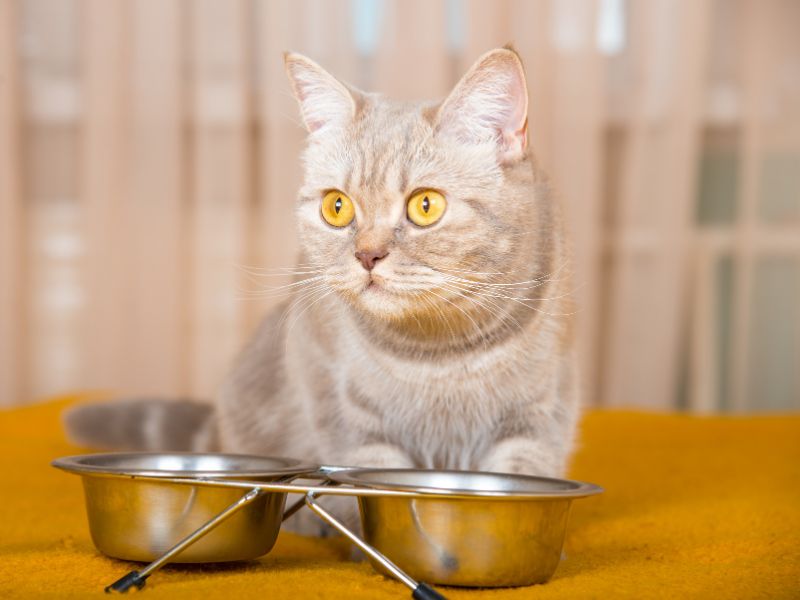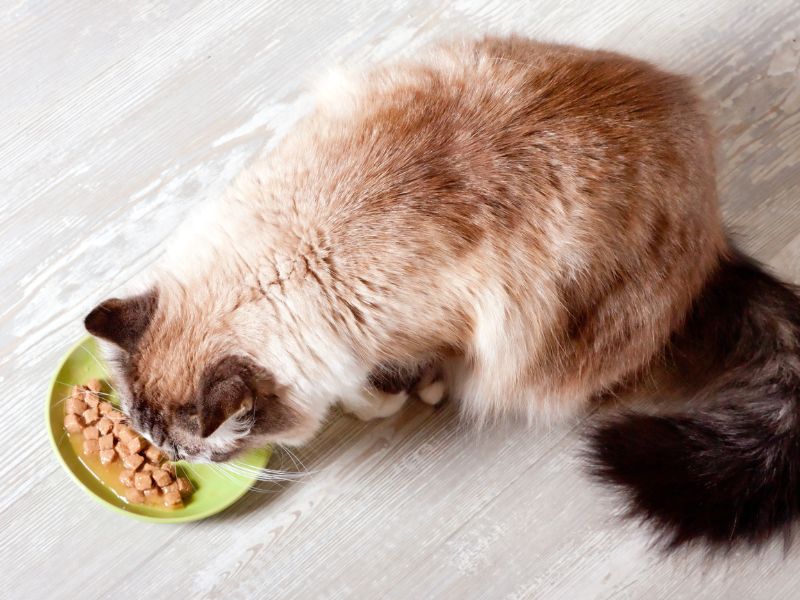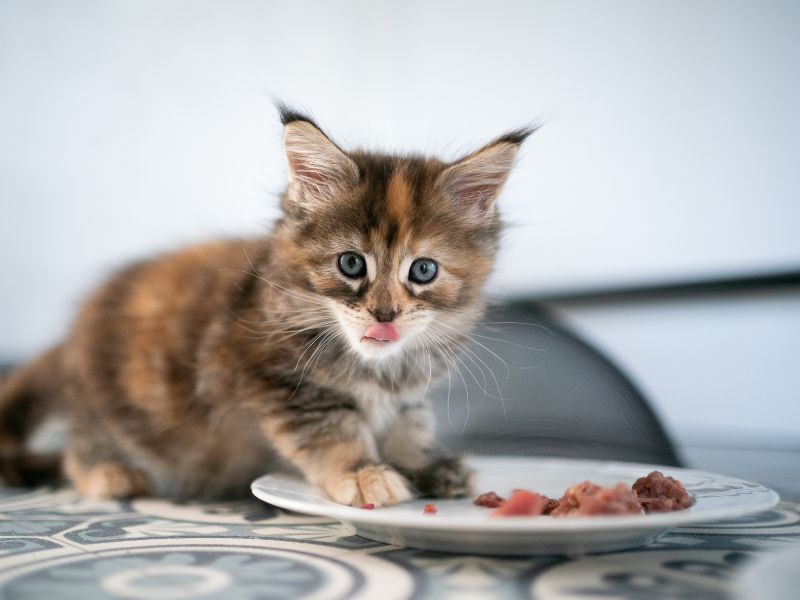Are you a concerned cat owner wondering why your furry friend seems to lose their appetite during hot weather? Well, you’re not alone. Many feline enthusiasts experience this puzzling phenomenon with their beloved companions. But fear not, as there are several reasons why your cat may not be eating as much when temperatures rise. One possible explanation is that cats naturally have a decreased appetite in hot weather, just like humans. They tend to feel less hungry due to the heat affecting their metabolism. Additionally, the high humidity can make their food less appealing, as it can become stale or spoil more quickly. Another reason could be that your cat is simply seeking cooler areas to rest and conserve energy, rather than expending it on eating. But don’t worry, there are ways you can help stimulate your cat’s appetite during hot weather, and we’ll explore those in detail. So, let’s dive into the fascinating world of feline eating habits and discover the secrets to keeping your cat well-fed and happy, even in the hottest of temperatures.
The Effects of Hot Weather on Cats’ Appetite
Hot weather can have a significant impact on a cat’s appetite. Just like humans, cats tend to have a decreased appetite when the temperature rises. The heat affects their metabolism, making them feel less hungry. Cats are naturally inclined to conserve energy during hot weather, and this includes reducing their food intake. Additionally, high humidity can contribute to a decrease in appetite. When the air is humid, their food can become stale or spoil more quickly, which can make it less appealing to them. It’s important to understand that a decrease in appetite during hot weather is a normal and natural response for cats. However, it’s still crucial to monitor their eating habits to ensure they are getting the nutrition they need.
Understanding Cats’ Natural Behavior in Hot Weather
To better understand why your cat may not be eating as much during hot weather, it’s important to consider their natural behavior. Cats are highly adaptable creatures, and they have evolved to cope with different weather conditions. In the wild, cats have a higher tolerance for heat compared to other animals. They are experts at finding cool and shaded areas to rest during the hottest parts of the day. This behavior helps them conserve energy and stay cool. It’s not uncommon for cats to reduce their physical activity and seek out cooler spots in your home during hot weather. They may choose to sleep in the basement, under furniture, or in the bathroom where the tiles are cooler. By understanding and respecting your cat’s natural behavior, you can help create a comfortable environment that encourages them to eat.
Common Reasons Why Cats May Not Eat in Hot Weather
There are several common reasons why your cat may not be eating as much during hot weather. One reason is that their food may not be as appealing due to the heat and humidity. Cats have a highly developed sense of smell, and the smell of stale or spoiled food can be off-putting to them. It’s important to ensure that their food is fresh and stored properly to maintain its palatability. Another reason could be that the increase in temperature and humidity is affecting their metabolism, causing a decrease in appetite. Cats naturally have a higher body temperature than humans, and when the ambient temperature rises, their body has to work harder to maintain its normal temperature. This can lead to a decrease in appetite as their body focuses on regulating its temperature rather than digesting food. Additionally, cats may seek out cooler areas to rest and conserve energy, which can take priority over eating. It’s essential to provide a cool and comfortable environment for your cat to help stimulate their appetite.

Providing A Cool and Comfortable Environment for Your Cat
Creating a cool and comfortable environment for your cat is crucial in encouraging them to eat during hot weather. Here are some tips to help you achieve this:
- Ensure proper ventilation: Make sure your home is well-ventilated to allow for air circulation. Use fans or open windows to create a cooling breeze.
- Provide shade: If your cat enjoys spending time outdoors, make sure they have access to shaded areas where they can retreat from the sun.
- Use air conditioning or fans: If you have air conditioning or fans, use them to keep the temperature in your home cool and comfortable for your cat.
- Provide cool surfaces: Place cool tiles or mats in areas where your cat likes to rest. These surfaces can help lower their body temperature and make them more comfortable.
- Offer fresh water: Ensure that your cat always has access to fresh, cool water. Consider placing multiple water bowls around your home to encourage hydration.
By providing a cool and comfortable environment, you can help stimulate your cat’s appetite and ensure they are well-hydrated during hot weather.
Ensuring Proper Hydration for Your Cat in Hot Weather
Proper hydration is crucial for your cat’s overall health, especially during hot weather. Cats have a low thirst drive, which means they may not naturally drink enough water. Here are some tips to ensure your cat stays hydrated:
- Provide fresh water: Always make sure your cat has access to fresh, clean water. Change the water daily to prevent it from becoming stagnant or warm.
- Use a fountain: Consider investing in a cat water fountain. The flowing water can be more appealing to cats and encourage them to drink more.
- Add water to their food: If your cat is not drinking enough water, you can try adding water to their wet food to increase their overall hydration.
- Offer ice cubes: Some cats enjoy licking or playing with ice cubes. You can offer them as a fun and refreshing way to keep your cat hydrated.
By ensuring your cat is properly hydrated, you can help maintain their overall well-being and encourage them to eat during hot weather.
Adjusting Your Cat’s Diet in Hot Weather
During hot weather, it may be necessary to make adjustments to your cat’s diet to accommodate their decreased appetite and changing nutritional needs. Here are some tips to consider:
- Offer smaller, more frequent meals: Instead of feeding your cat large meals, consider offering smaller meals throughout the day. This can be more appealing to cats with a decreased appetite.
- Feed wet food: Wet food contains higher moisture content, which can help keep your cat hydrated. It can also be more palatable to cats with a decreased appetite.
- Consider cooling treats: You can offer your cat frozen treats or chilled wet food to provide a refreshing and enticing meal option during hot weather.
- Monitor weight and body condition: Keep an eye on your cat’s weight and body condition. If you notice any significant changes, consult with your veterinarian to ensure your cat is receiving the appropriate nutrition.
It’s important to remember that any changes to your cat’s diet should be done gradually to avoid digestive upset. Consult with your veterinarian for specific dietary recommendations based on your cat’s individual needs.
Potential Health Issues Related to Cats Not Eating in Hot Weather
While a decreased appetite during hot weather is generally normal for cats, it’s essential to monitor their eating habits. If your cat consistently refuses to eat or shows other signs of illness, it’s important to consult with a veterinarian. A sudden or prolonged loss of appetite can be indicative of underlying health issues, such as:
- Heatstroke: Cats are susceptible to heatstroke, which can cause a loss of appetite, lethargy, and other symptoms. If you suspect heatstroke, seek immediate veterinary care.
- Dehydration: A decrease in appetite can lead to dehydration, which can be dangerous for cats. If your cat is not drinking enough water, it’s important to consult with a veterinarian.
- Dental problems: Cats with dental issues may experience discomfort while eating, leading to a decrease in appetite. Regular dental check-ups are essential for maintaining your cat’s oral health.
If you notice any concerning symptoms or changes in your cat’s eating habits, it’s best to seek professional veterinary advice.

See Also: How to Keep Your Cat Cool During a Heatwave
And: How to Help Your Cat Cope with Stress and Anxiety
Tips For Encouraging Your Cat to Eat During Hot Weather
If your cat’s appetite decreases during hot weather, there are several tips you can try to help stimulate their appetite:
- Serve fresh, high-quality food: Ensure that your cat’s food is fresh and of high quality. The smell and taste of fresh food can be more enticing to cats.
- Warm up their food: If your cat prefers warm food, you can try warming their wet food slightly to enhance the aroma and make it more appealing.
- Offer a variety of textures: Some cats may have preferences for certain textures. Experiment with different types of wet food to find what your cat enjoys.
- Create a comfortable eating environment: Find a quiet and cool area for your cat to eat. Avoid placing their food near their litter box or in a noisy area that may cause stress.
- Use food puzzles or interactive toys: Stimulate your cat’s mental and physical activity by using food puzzles or interactive toys that dispense treats. This can make mealtime more engaging and enjoyable for your cat.
Remember to be patient and observe your cat’s preferences. Every cat is unique, and it may take some time to find the right approach to encourage them to eat.
Consulting With a Veterinarian for Further Guidance
If your cat’s decreased appetite persists or if you have any concerns about their eating habits during hot weather, it’s important to consult with a veterinarian. They can provide further guidance and ensure that there are no underlying health issues contributing to the decreased appetite. A veterinarian can also offer tailored advice based on your cat’s individual needs and health conditions. Don’t hesitate to reach out for professional help if you’re unsure or worried about your cat’s eating habits.
Conclusion
Understanding why your cat may not eat as much during hot weather is essential for their overall well-being. Cats naturally have a decreased appetite in hot weather, and it’s important to provide a cool and comfortable environment to stimulate their appetite. Ensuring proper hydration and adjusting their diet can also help maintain their health during hot weather. Monitor your cat’s eating habits and consult with a veterinarian if you notice any significant changes or concerns. With proper care and attention, you can help keep your cat well-fed and happy, even in the hottest of temperatures.

